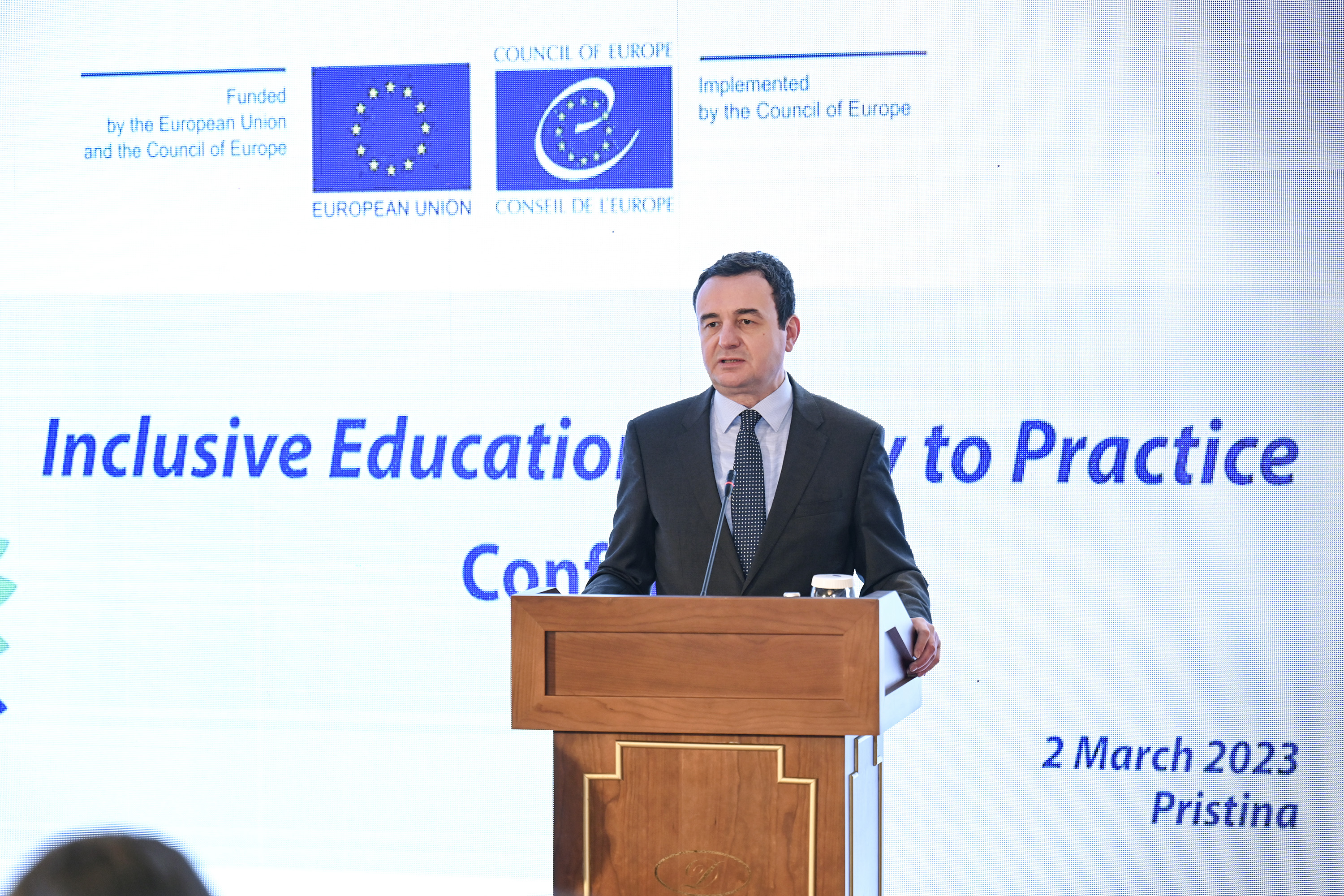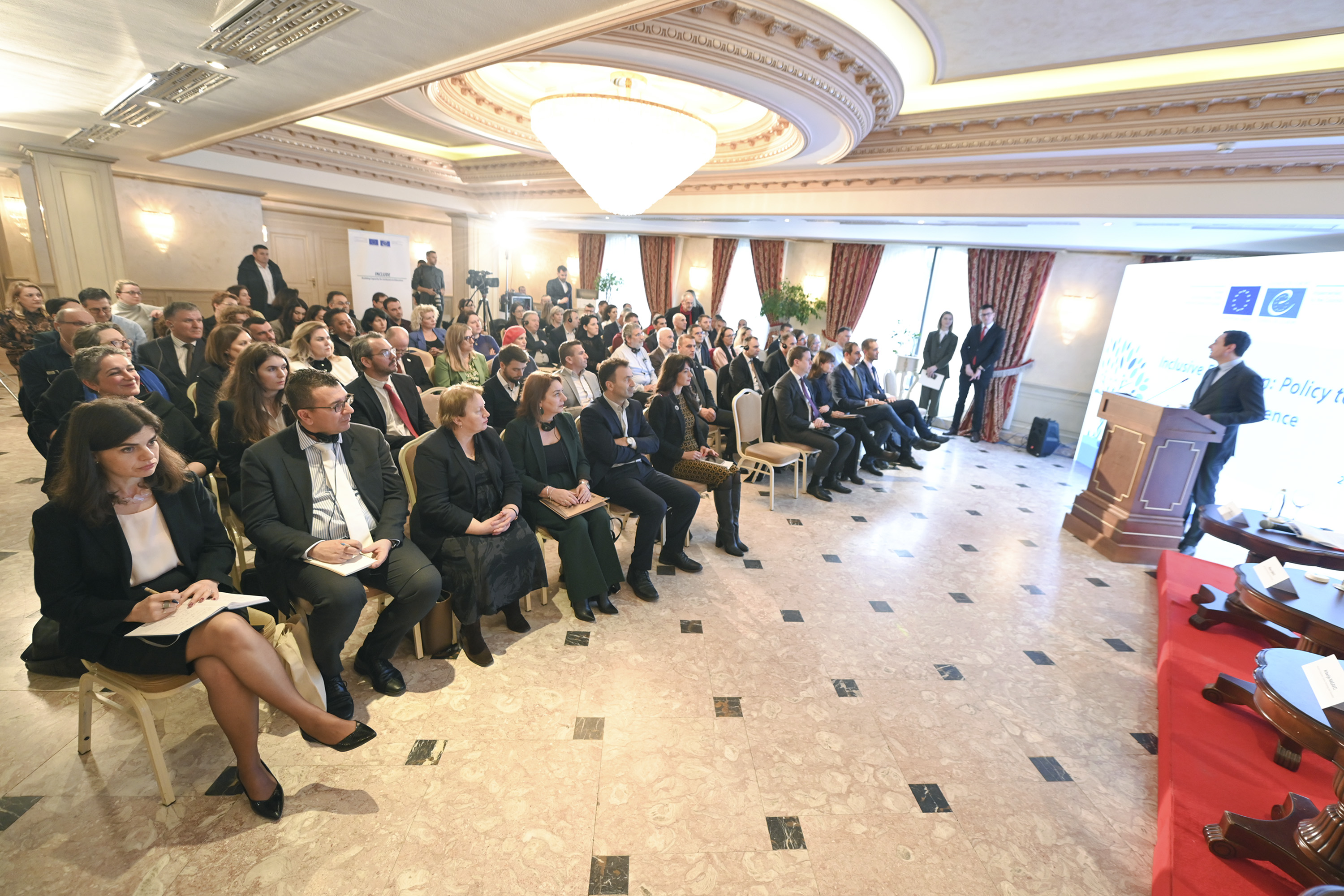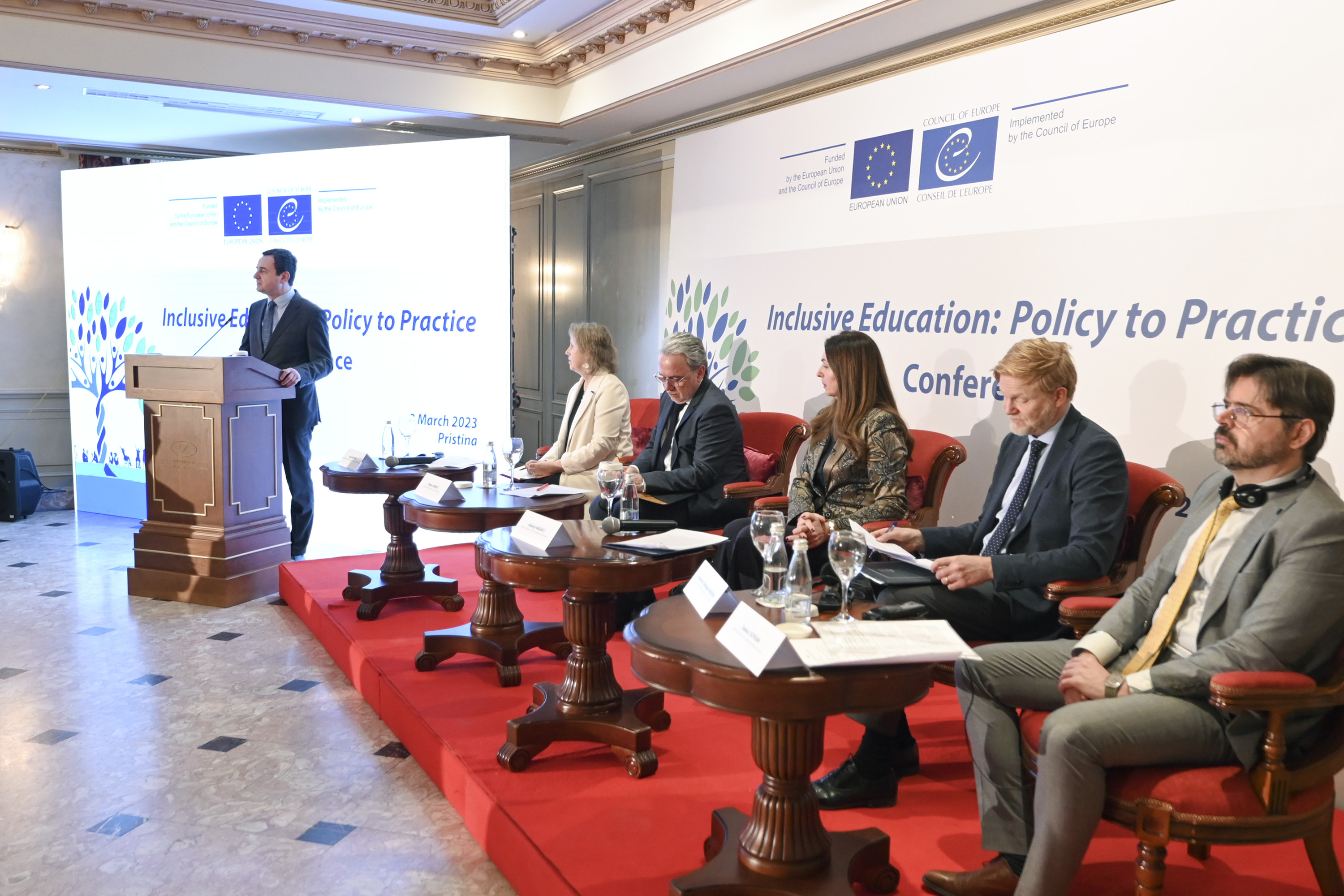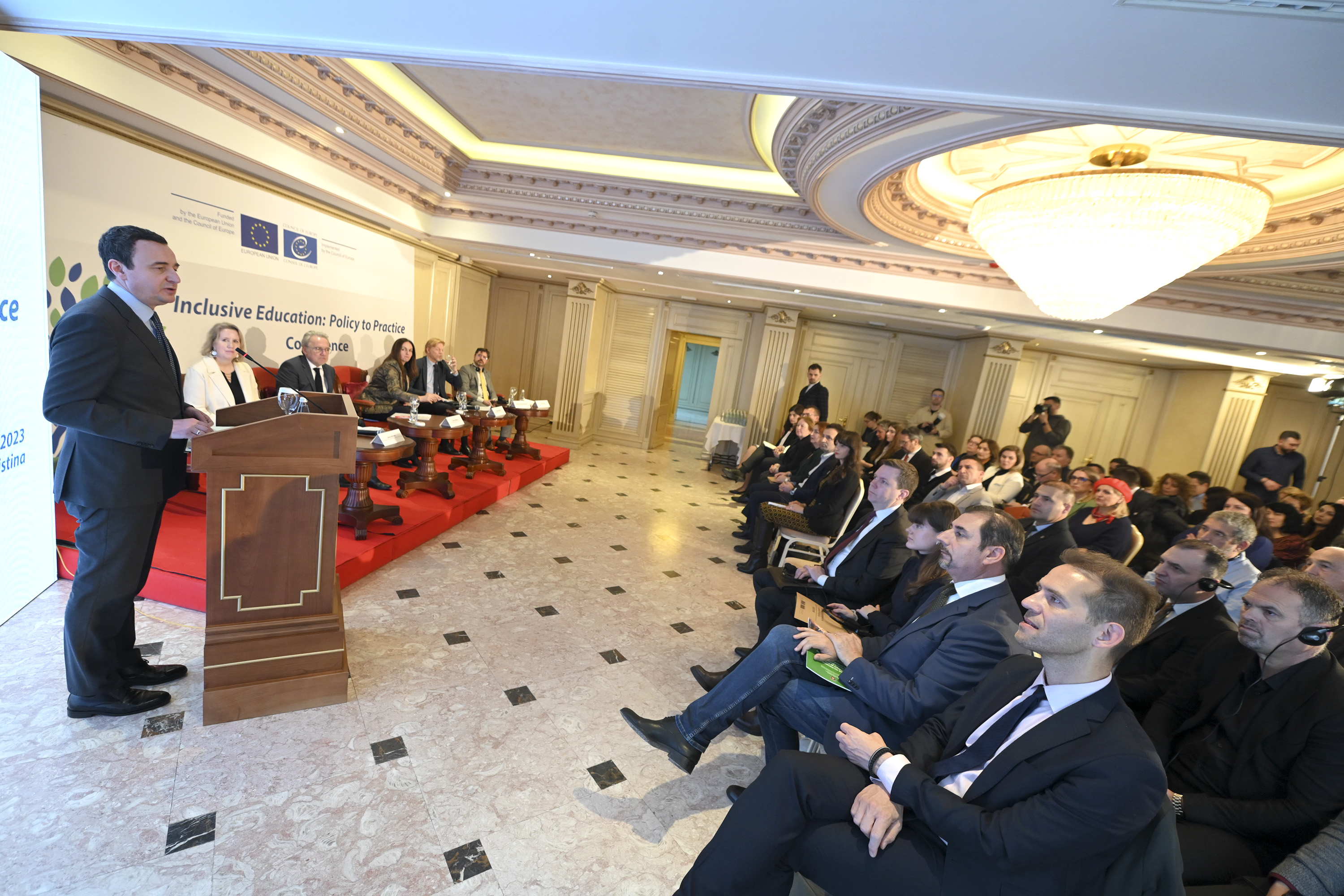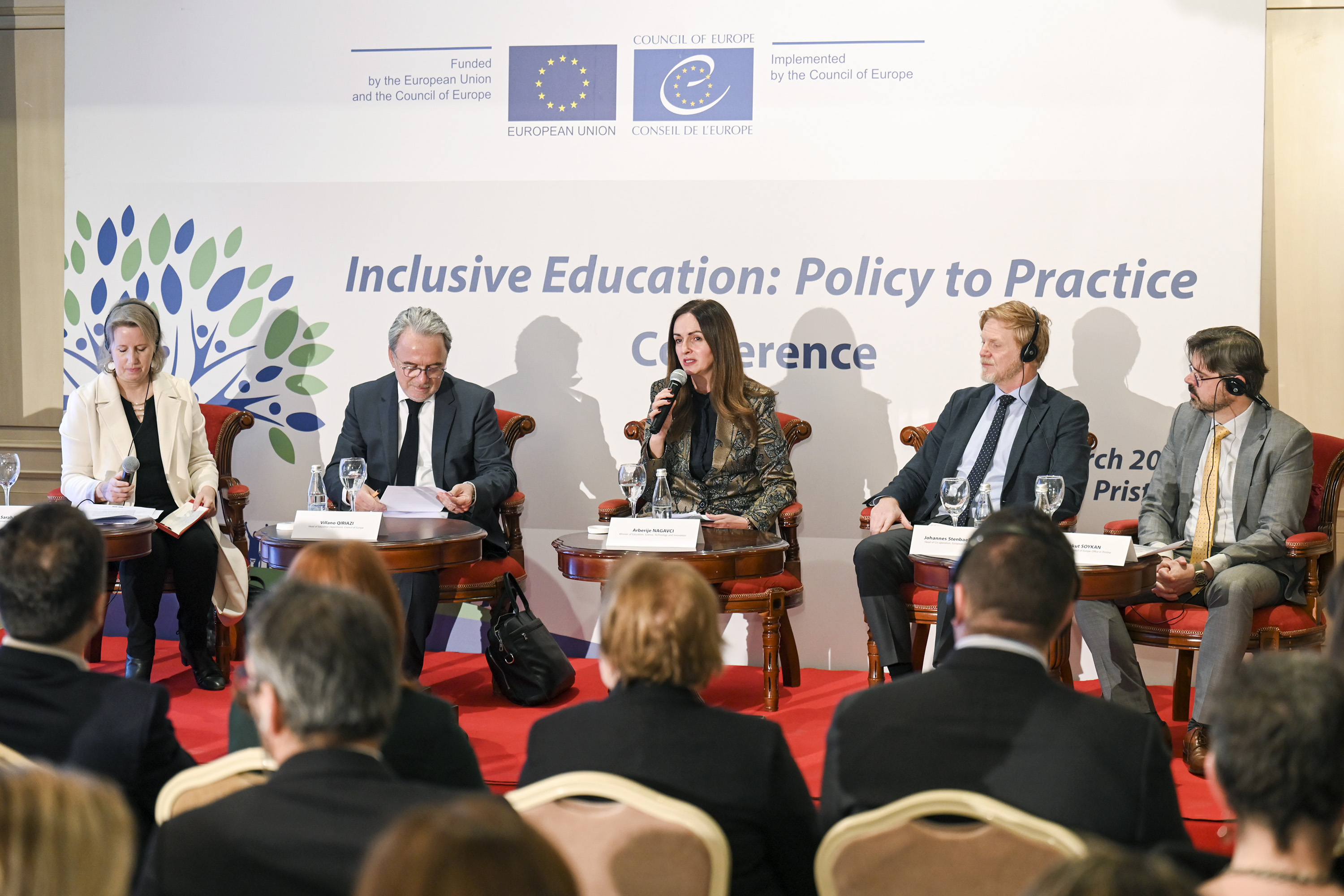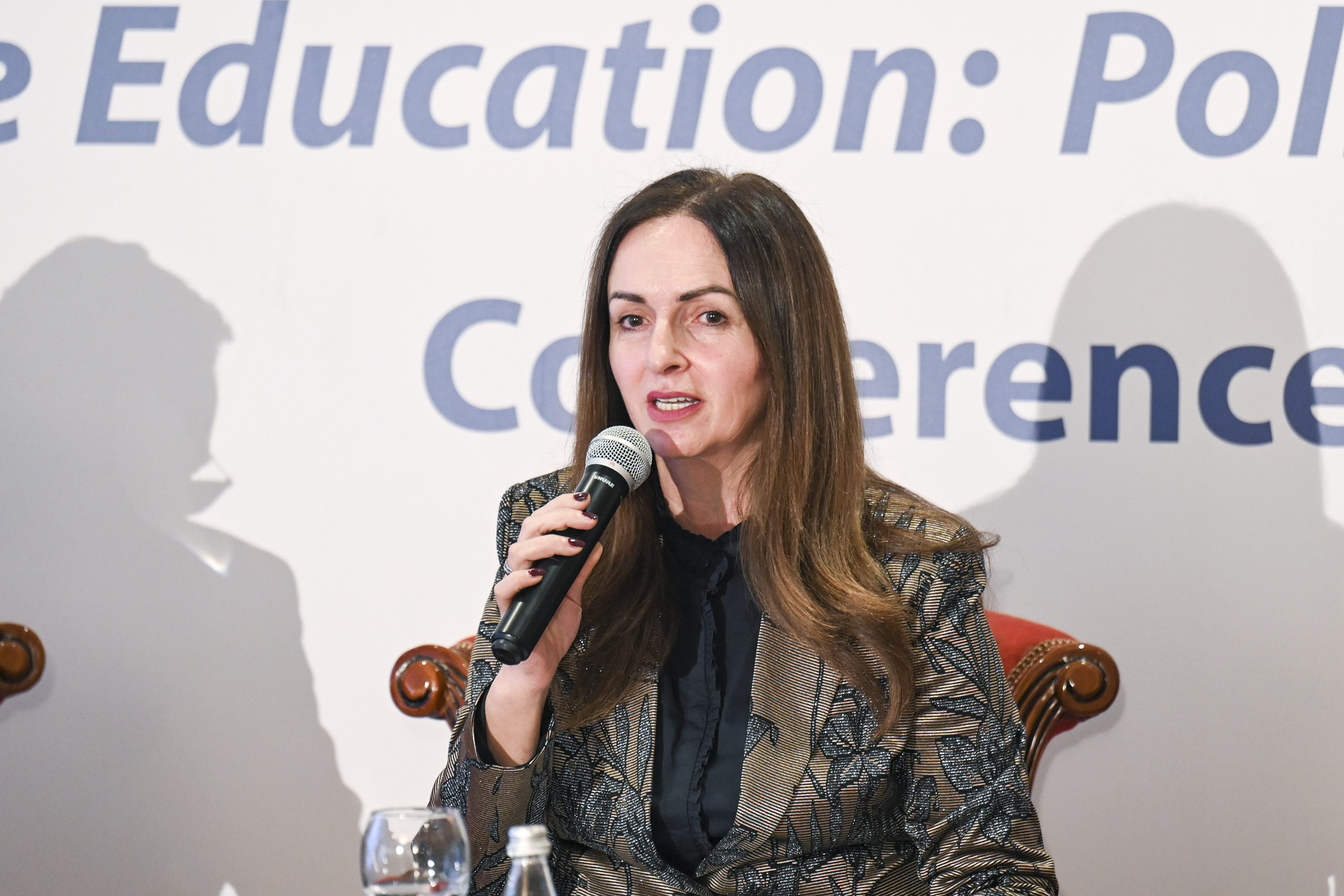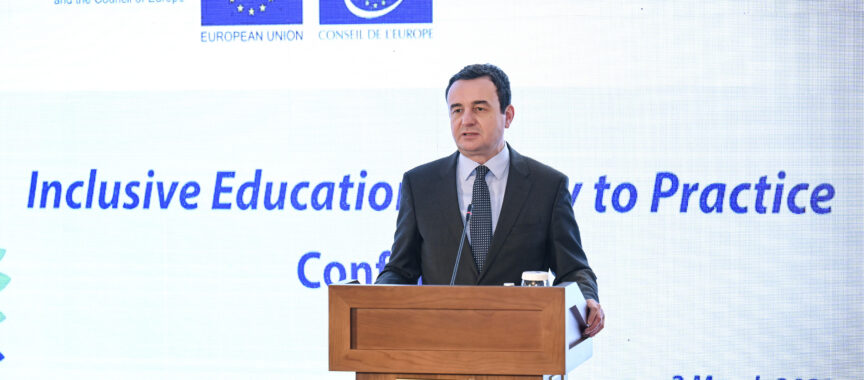Prishtina, 2 March, 2023
The Prime Minister of the Republic of Kosovo, Albin Kurti, participated in the conference organized by the Council of Europe and the Office of the EU, entitled “Inclusive education: From policy to practice”.
In his speech, Prime Minister Kurti said that when we took over the governance of the Republic of Kosovo, almost 2 years ago, we said that our focus was a fair society for all. So, as he said, the goals of this Involvement project to build capacities for inclusion in education are very important for us. The best of Kosovo society should be reflected in our schools and our schools should offer fair opportunities, he said.
He emphasized the increase of more than 26% of the education budget in the last two years, the decision to make public higher education free and the scholarships that the Ministry of Education, Science, Technology and Innovation has donated to students of the Roma, Ashkali and Egyptian as evidence of the government’s attention to education, as one of the pillars of sustainable development.
The Prime Minister announced that they have inherited a situation where only 59% of young Roma, Ashkali and Egyptians complete lower secondary education and addressing and addressing this is a must for all of us.
MICS data from interviews with Roma, Ashkali and Egyptian teenagers aged 15-19 show that 13% of girls and 16% of boys in these communities have felt discriminated against. In the total population, the figures are only 2% of girls and 3% of boys. This is the situation from 2020 and in 2023 and 2024 we do not want any child in our country to feel discriminated against. We want all our children to be proud of who they are”, declared the Prime Minister.
Two of the five pillars of the Strategy for the Advancement of the Rights of the Roma and Ashkali Community are identified as education and combating discrimination, while the Strategic Plan for Education identifies the inclusion of vulnerable groups in education as one of the strategic objectives. In this regard, the prime minister listed concrete initiatives aimed at translating the strategies into reality:
1. Support to Prevention and Response teams to school dropout and non-registration in all municipalities;
2. Expansion of teaching in the Romani language in four municipalities;
3. Continuation of the annual distribution of 500 scholarships for high school students from the Roma, Ashkali and Egyptian communities;
4. Support of Learning Centers;
5. Providing mediation positions in education in at least seven municipalities with a higher concentration of Roma and Ashkali communities, with the aim of reducing dropout and non-enrollment in schools.
From experience, he continued, education is not only the state’s mission for its people, but it is also the place where children meet the state for the first time, and this meeting should be one with warm, impressive hospitality, which children will never forget it and that later determines the professions they choose as well as the contribution and work they do.
The Prime Minister at this conference hailed the Inclusion project for its comprehensive approach, including mentoring and teaching Roma, Ashkali and Egyptian boys and girls, and addressing discriminatory attitudes.
The complete speech of the Prime Minister of the Republic of Kosovo, Albin Kurti:
Dear Mr. Soykan, Deputy Head of the Council of Europe in Prishtina,
Dear Minister of Education, Science, Technology and Innovation, Arbërie Nagavci,
Dear Mr. Stenbaek Madsen of the EU Office in Kosova,
Dear Mr. Qiriazi of Council of Europe,
Dear Professor Gollob from Zurich University of Teacher Education,
Dear teaching professionals from Kosova and beyond,
Dear your excellency, Ambassador of Finland in Republic of Kosova
When we took over the government of the Republic of Kosova, almost exactly 2 years ago, we said that our focus was a society which was fair for everyone. So the aims of this ‘Include’ project on building capacity for inclusion in education are very close to our hearts. The best of Kosova’s society should be reflected in our schools, and our schools should offer fair opportunities. For everyone. It should not matter how special your needs are, or what ethnic group you come from. We want every child to be in school and know that they will be supported there, to learn and thrive and develop the skills that they will need for their own future and the future of our country..
It is therefore a pleasure to be with you and hear more about the work that you have been doing, and to discuss on how we can make education fully inclusive.
We named 2022 as the Year of people with special needs in Kosova, and it was my privilege during the year to get to meet and talk to children and adults with special needs, and their parents and caretakers. To understand just how much potential there is among this group of Kosovan citizens. When I think of the dreams I heard articulated at one meeting in my office from a boy living with autism, or when I remember the little girl chatting to me about all that she has learned at the activities she attends for children with physical disabilities, I know that these of our young citizens have so much to contribute to our society.
Likewise, I have had the chance to meet with inspiring Roma, Ashkali and Egyptian young people through the series of round tables I’ve held at my office, over the last year, and the visits I’ve made to see projects in action. There was the teenage girl in Prizren who wanted to share the poetry she had learned in her mother tongue, Roma. I remember, too, the young group of actors from the community in Fushë Kosovë who invited me to the play they had devised together. And there was the discussion I had with the Roma, Ashkali and Egyptian students who benefited from the scholarships that the Ministry of Education allocated this year for the first time, in collaboration with the Ministry of Local Government Administration. These scholarships were specifically for Roma, Ashkali and Egyptian students who were studying at public universities to graduate in subjects like education, so that they would become visible role models. The enthusiasm and commitment to social progress that I saw among these young people inspires me, and no doubt many others, to ensure that they and all children are given the support that they need.
Because as we know the challenges are enormous. We have inherited a situation where only 59% of Roma, Ashkali and Egyptian youngsters finish lower secondary education.
Doing something about this is a must for all of us. The solutions cannot just be technical. I applaud the Include project for the holistic approach it takes, including mentoring and tutoring for Roma, Ashkali and Egyptian boys and girls, and tackling discriminatory attitudes. The MICS data from interviews with Roma, Ashkali and Egyptian teenagers aged 15-19 shows that 13% of girls and 16% of boys in these communities have felt discriminated. Across Kosova’s population, the figures are only 2% of girls and 3% of boys. This is the situation from 2020, and in 2023 and 2024 we don’t want any child in our country to feel discriminated. We want our children all to be proud of who they are, and the contribution of this project towards that goal is welcomed.
As we know from our experience, education is not just mission of the state for its population but it is also the venue where children meet the state for the first time, and this encounter, this meeting, must be one of impressive warm welcoming that children will never forget and will define them later on the professions they chose and contribution and work they do.
Education is the main pillar, on the other hand, for the sustainable development of our country. That’s why we’ve increased the education budget for over 26% for the last two years and made higher education free. For Bachelor and Master degrees in our universities you do not have to pay. Only for PhD one has to pay, and that again is not that much. We’ve identified education and the tackling of discrimination as two of the five pillars of our Strategy for Advancing the Rights of the Roma and Ashkali community. Our Strategic Plan for Education identifies the inclusion of vulnerable groups in education as one of its strategic objectives. To make these strategies a reality we have ambitious concrete initiatives, such as:
• First, supporting School Prevention and Response Teams towards Abandonment and Non-Registration in all municipalities. School is a must for everyone, as an opportunity for everyone;
• Second, expanding teaching in Roma language in 4 municipalities;
• Third, continuing to allocate 500 scholarships on an annual basis for students of Roma, Egyptian and Ashkali communities attending upper secondary school
• Fourth, support to learning centres;
• and fifth, providing mediation positions in education in at least 7 municipalities with the highest concentration of Roma and Ashkali communities to reduce non-enrolment and dropout.
These policies, plans and budget allocations for visible change show the commitment of our government to the values promoted through the Council of Europe. Our passion for these values is the reason that we feel that we belong in the Council of Europe and we know that we can benefit and contribute further with membership.
I will continue to meet with young people all over Kosova. I hope to meet again with the boy living with autism, with that girl who told me from her wheelchair about her learning and achievements, with the teachers in training from the Roma, Ashkali and Egyptian communities and with many other young people who have been supported by our education system. We will continue to support them in being the best version of themselves, in a Kosova which is the best version of itself. I am happy that we are together contributing to this vision.
Thank you very much.
Last modified: March 7, 2023
